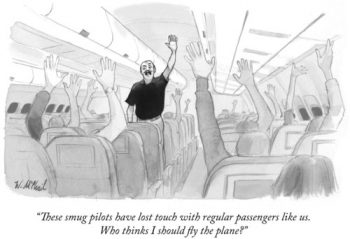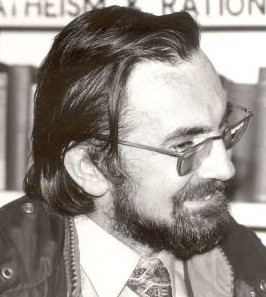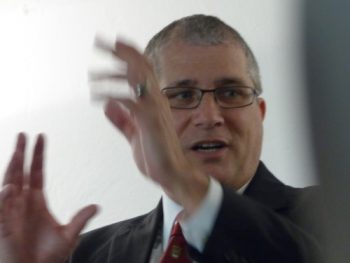We are developing the social individualist meta-context for the future. From the very serious to the extremely frivolous... lets see what is on the mind of the Samizdata people.
Samizdata, derived from Samizdat /n. - a system of clandestine publication of banned literature in the USSR [Russ.,= self-publishing house]
|
Yesterday, at my personal blog, I expressed extreme gratitude to Christian Michel for letting me talk last Friday, at his home, on a subject which, when I first floated it to him, must have seemed very vague and vacuous, although judging by what he said about my talk afterwards, he was almost as pleased by it as I was.
Tonight, I will be attending another meeting organised by Christian Michel, partly out of gratitude for last Friday’s meeting. There is a London tube strike happening today, and I am pretty sure that Christian is now feeling a bit nervous about attendance, so I will make a point of being there.
The title of tonight’s talk is “The Collision of Fintech and Traditional Banking”. The speaker will be Sasha Karim. (I’m guessing that this is the Sasha Karim mentioned here.)
I am hoping that what Sasha Karim will say is, among other things, that, by radically lowering transaction costs and thereby making the life of a “financier” (formerly only available to ultra-clever (but not necessarily ultra-wise) people who had access to or who were attached by ultra-rich (but again, not always ultra-wise) employers to expensive machines in expensive buildings) “fintech”, aka the new world of financial transactions on mobile phones, now available to all people who are above dirt poor, is creating a world in which the old dream dreamed by the likes of Friedrich Hayek of denationalised money, can become a reality and rescue us all from the great catastrophe that has been governmentalised fiat paper currencies, of the sort denounced by another friend of mine, Detlev Schlichter. We shall see. But maybe I am being too optimistic, both about the talk and about the world. Concerning the talk, I will report further.
Hayek’s crucial little book on denationalised money has long been available on the www as a free .pdf download, but I only just found out that Detlev Schlichter’s book is now available as a free-to-download .pdf file also. Blog and learn.
As I work away at a talk I am to give tomorrow evening at Christian Michel’s, I am also, of course, wandering about in the www. And during the latest wandering I was provoked into thinking about another talk, one that I will be hosting rather than giving, on the last Friday of February. Marc Sidwell will, that evening, be speaking about: “Twilight of the Wonks? Promoting freedom in a post-expert world”.
This rather witty cartoon, which I came across here, is very pertinent to Marc Sidwell’s talk, I think:

This cartoon is now to be seen all over the www, partly because, I surmise, both sides of the argument that it alludes to are drawing attention to it. The Clintonians are pointing at it and saying: there, look at those silly Trumpsters, all voting to crash and burn America. And the Trumpsters are pointing at it, and saying: look at those smug liberals assuming that they are better at flying the airplane of government, in the way that a pilot obviously is better than his mere passengers at flying an actual airplane. They just don’t get it, blah blah.
The point being: there is being an expert, where you actually do know essential stuff. And then there is being an “expert”, where what you say you know or think you know ain’t necessarily so.
Personally I favoured and favour Trump, partly because I put Hillary Clinton into the latter category, of being an “expert” with sneer quotes rather than without them. She has a long career of crashing whatever metaphorical airplanes she flies, her email fiasco being only one of the more recent of such crashes. Crashing rather than flying is what she is “expert” at. And her speeches over the airplane intercom only convince those already convinced. Many feel the exact same way about Trump, but my impression, reinforced both by his campaign and by how he has conducted himself since his campaign ended in victory, is that when it comes to being less un-expert, Trump wins compared to Clinton. We shall see.
I also prefer, with all the usual libertarian reservations, the ideological agenda that Trump, almost despite himself, is now dragging into greater prominence. The agenda (see this gigantic crash) that Clinton would have kept in great prominence is one that I detest.
I will now send the link to this posting to Marc Sidwell. If you would like to learn more about attending the meetings I host every month, and/or those that Christian Michel hosts, email me by clicking on where it says “Contact”, top left, here.
LATER: See also what Instapundit says.
Recently a friend who works for the BBC asked if I knew of any good general interest but topical stories coming up any time soon, and I said that when they finally finish London Gateway, the new container port now being constructed and even already slightly used, on the north bank of the Thames Estuary, that will be made a big fuss of.
She then told me about a series that the BBC World Service is doing about 50 Things That Made the Modern Economy. I said that the Container certainly should be one of these Things. She later determined that the Shipping Container does indeed feature in this series, and she sent me that link. Amazing what a difference an email with a link makes to your willingness to attend to something.
This piece about the Shipping Container lasted under ten minutes, and, although I had heard most of the story before, I liked it. So I then sampled a couple of the other Things, about which I knew less and nothing, namely: the Barcode, and the Haber-Bosch Process. The latter is for turning the nitrogen in the air into fertiliser.
The next Thing I listen to will be Concrete. I already know what concrete is, but I expect to learn a lot more, about it, and about what it did to and does for the world. Made life a lot easier for farmers, apparently. Which, to a townee like me, is one of those many things which is obvious, but only if someone makes me think about it.
Recommended. An economist and economic historian by the name of Tim Harford has done a number of these Thing broadcasts, including the ones about the Container and about the Barcode. He is already very well known, but not so well known to me. But, I can already tell you that he also is to be recommended, going only by how he talks about these Things.
LATER: See also this earlier posting here, about similar Things.
I am always on the lookout for elevated platforms, natural or artificial, to look out over London from, and to take photos from. And as luck would have it, one of my favourite such platforms is one that I live directly under. Yes, if I go up to the roof of my block of flats, I can see, and I can photo, things like this:

That thing being the MI6 Building, made famous by the Bond movies. In the Bond movie that they were showing on Brit TV earlier this very evening, this building suffered an explosion. Dame Judi Dench looked on, aghast.
Another entertaining thing to be seen from this spot is the new US Embassy, now nearing completion just up river, as luck would have it, from the MI6 Building. Those peculiar structures sticking out to the side, on both sides as we look in the photo below, intrigue me. Officially they are sunshades. So, nothing to do with stopping people from eavesdropping? Absolutely not. Never crossed their minds. Mind you, there won’t be any such structure on the windows facing us, so maybe this is true. But, I prefer to believe otherwise:

All around this new US Embassy there is a huge building boom in progress. That Special Relationship that people keep saying is about to end remains pretty special, I would say.
Whereas the cranes working away around the above building are there to build it, the crane in this next picture is there to dismantle the big block of a building that we see. This is “New” Scotland Yard. The Metropolitan Police have already moved out, to an even Newer Scotland Yard, nearer to the river.

Next up, the two familiar towers attached to the Houses of Parliament, Big Ben and …, you know, … the other one. On the far side of the river but directly in line, The Wheel.

Finally, here are two snaps of how the same bit of the skyline was looking last night, just after midnight. I had guests with me last night, and after we had counted in the new year while watching these fireworks on the telly, I suddenly realised that we could see these same fireworks for real, if we just ran up a few staircases, and provided the fireworks kept on going for a bit. Which we did and they did:

Such is the quality of the cameras on mobile phones these days that several of my guests were also able to take photos.
In the above picture, The Wheel is totally blotted out, but in this final picture, you can clearly see it:

All of this was in aid of everyone wishing everyone else a Happy New Year, and I wish that to all my fellow Samizdatistas, and to everyone else who reads this.
I wanted to believe that Hillary Clinton would lose the recent US presidential election, so when I started reading Scott Adams saying that she was indeed going to lose, to Trump, I kept on reading him. Like so many others, I like to read within my bubble, as well as outside it. That means I also now read Scott Adams on every other subject he deals with in his blog. I am now digging back into his archives for more wise and witty verbiage. I am surely not the only one doing this now.
Scott Adams has a girlfriend called Kristina Basham, who, it would appear, is working and working at becoming one of those people who is famous for being famous. This is one of those labels that most people seem to assume is an insult. But being famous is a skill and a job, like any other skill and job. Your basic skill is that you know how to attract attention, and you basic job is that you sell this ability and live with the adverse consequences of it as well as the benefits. Scott Adams describes very well the sort of work that goes into becoming one of these F4BF people, as I will call them from now on. Kristina Basham is not, you see, outstandingly good at anything in particular. She is just pretty good at a whole “stack” of things, which, when you combine them, are making her into someone F4BF.
I say: good for her.
The claim that people who are F4BF contribute nothing to the world is the latest iteration of that very old and very bad idea that there is a “real” economy, consisting of work that people are used to doing and which their ancestors even did, like farming and then after that factory working; and then there is the “unreal” economy, consisting of silly things that add nothing to the “real” economy, but instead just leach off it, like financial services (which actually make farming and industry massively more productive by telling farmers what to farm and industrialists what to industrialise), and more recently jobs like being F4BF. (Even being a factory worker was once upon a time denounced as being unreal.)
Being a celeb, and in particular being nothing but a celeb, an F4BF, which is to say being good at attracting attention to oneself but for no single and obvious reason, but still being good at it, is a vital part of the modern economy. Celebs, including F4BFs, enable attention to be diverted away from major economic investments, while the work of creating or building them is being done and needs not to be disturbed, in the secure knowledge that when attention is finally demanded, and you need to attract a lot of business very quickly or else a lot of money will be lost while the word spreads by mere unassisted word of mouth. For that grand opening of whatever it is that you have been quietly working on for however long it has been, you hire a bunch of celebs. Including maybe some of that particular sort of celeb who are F4BF, pure and distilled celebs who are nothing but celebs.
Discuss.
Like all London-based libertarians of a certain vintage, I have fond and vivid memories of Tony Hollick, who died in October of this year. At the time when he was most active in the British libertarian movement, when that movement’s membership was numbered only in the dozens or less, people like Tony made a huge difference, attending and helping to organise meetings, writing and editing and, as is explained so well below, above all, arguing, which is what you are bound to do with ideas if you take ideas as seriously as Tony Hollick did. The moral and intellectual support that Tony supplied, in particular, to the late Chris R. Tame, was especially important and valuable. And see also this obituary of Tony Hollick, by Tim Evans.

Last week, on Wednesday December 7th, Tony Hollick’s funeral took place at Beckenham Crematorium, London. Below is the eulogy that his much loved godson, Gerald Hartup Jnr, wrote and read out on that sad occasion:
Tony was my godfather and I loved him dearly. He was one of my father’s oldest and closest friends and was much loved by all in the Hartup family.
He was a spectacular teacher, kind, generous with his time and very patient. As I was growing up reading philosophy, economics, politics and following current affairs I would always discuss these matters in depth with him. He was a superb sounding-board and I was very lucky to have spent so much time speaking with him. I learned a vast amount from Tony and am eternally grateful to him for that.
Tony did not like authority (huge understatement!). He particularly disliked authority when combined with a sense of injustice. He was a man with an extremely strong view on what is right or wrong and had an unbendable set of guiding moral principles. He was stubborn, passionate and had fire in his belly which would be shown in glorious style when he encountered something he considered wrong or unfair. This was a trait he displayed early on when as a boy he was expelled from two of the finest schools in the world – Dulwich College and Geelong Grammar School. A common theme behind both of those expulsions was a steadfast refusal to accept or yield to what he felt were unfair treatments and practices. He had a powerful sense of righteousness and this was always evident in the social or political causes he championed.
Tony is one of the most erudite people I have known. Not attending university did not hinder his accumulation of knowledge as he devoured swathes of books. His studies were broad, varied and extensive. His favourite fields were political philosophy and physics both in which he developed an awesome depth of knowledge. He was very thoughtful, intellectually curious and he carried himself with a scholarly disposition.
Politics was a big part of Tonys life. He had a unique take on matters and he would have described himself as a left leaning libertarian. In terms of political activity he was a founding member of the Libertarian Alliance, he worked at the alternative bookshop (a focal point of the Libertarian movement at the time), The National Association for Freedom (later the Freedom Association) and FOREST (Freedom Organisation for the Right to Enjoy Smoking Tobacco). He certainly practised what he preached. He was a self-styled defender of freedom political activist and he put his health and his body on the line for the cause. It is important that this is remembered.
He was always entertaining to debate with and wow, he loved to argue. As a child I would always hear my father on the phone with Tony arguing passionately about some political topic. As I got older and smarter the baton was passed to me and I too would spend considerable time on the phone with him arguing and debating whatever matter was at hand. It really could be anything – political, philosophical, religious, historical, moral, cultural, you name it – he would have a view on it and would argue it. I think he just really loved the sport of it. Verbal sparring must have been one of his favourite things to do and with my father and I, he had some tenacious and willing sparring partners. He could have made a very imposing barrister. I do pity the many hapless victims who would have stumbled into a debate with him unknowing or unprepared for his assault! Debating him was great fun, challenging and at times exasperating – it certainly sharpened up my and my father’s oratory skills.
He was an intriguing character with some fun interests. He was a tech savvy early embracer of computers and the internet. He loved science fiction, film and literature. The Lord of the Rings, Star Wars and The Matrix were sources he would often use for analogies or making comparisons from. Working on designing and producing electrically powered roller-skates was a hobby of his. He was a horologist and truly loved the beauty of watches. His prized possession was an Omega Speedmaster pre moon landing watch which he took immaculate care of for 50+ years, it gave him immense joy and he never tired of talking about it. He adored cars and motorbikes and over the years he owned some really cool vehicles. He was a cat person, long after his dear cat Beeper passed away he would affectionately recall stories about how brilliant, intelligent and lovable a creature Beeper was.
“Athens or Sparta?” was a question Tony considered crucial to ask when trying to get an understanding of a person. Of course, with Tony, it was never a simple question but the start of a long, playful and philosophical dialogue. It is very difficult to sum up a character as colourful and complex as Tony but to do so in one word I would choose “Athens”. He was unquestionably “Athens” and I think he would be happy with that.
This explains a lot:

The European Union is moving into a new headquarters in Brussels, which features a huge glass atrium enclosing a bulging, lantern-like structure.
See an earlier posting here from way back about Parkinson’s Other Law.
LATER: Parkinson explains.
I haven’t yet found or invented the exact right phrase to describe it, but I know it when I hear it and I do not like it. “Reductive grumbling” is the best I can do to describe what I am getting at, until such a time as a better description of the thing presents itself to me. I’d been meaning to blog about this very bad mental habit for quite some time, and I have now been jerked out of my torpor by the fact that someone else has just now also been denouncing this way of thinking and talking. Which means that I can now do a more meaningful blog posting with a link to this denunciation, as reported by Kaitlin Collins of The Daily Caller, and with quotes from this denunciation:
“It’s easy to make anything feel small and silly by reducing it to its chemical composition or its various component parts …”
… provided the person on the receiving end of your reduction doesn’t see through the trick you are trying to play, as Mike Rowe does.
Rowe is responding to a woman who had complained about Mike Rowe’s objection to people burning the US flag. Rowe doesn’t argue that burning the US flag should be forbidden by law, but he doesn’t like it.
“But if you really believe our flag is nothing but a ‘mere symbol,’ equally suitable for flying or burning, ask yourself if you’d be comfortable if the people you work with suddenly started coming to the office in pointy white hats fashioned from bedsheets? Would that be a problem for you? Or how about The Rainbow Flag, favored by the LGBTQ community? Would it be OK if people started burning that? If not, why not? I mean, it’s only a symbol, right?”
I myself wrote about this syndrome, over a quarter of a century ago now, in this Libertarian Alliance rant which I still remember fondly and which was provoked by a P. J. O’Rourke rant about an epic trip he once made across America, in a Ferrari. Even though the technology I ranted about (compact discs) was pre-internet and now pretty much obsolete for all but compact disc dinosaurs like me, my ranting still works, for me anyway.
→ Continue reading: Mike Rowe denounces reductive grumbling (and so do I)
Baroness Warsi on Peston on Sunday, talking about “identity”:
Well there’s a big report coming out on Monday actually, a government report on integration, which tries to kind of unpick who it is we are, what it is that we can all convalesce around. …
It sounded as if she thought we had all been suffering from some sort of medical condition. Brexit? Perhaps she does think this, about that. But, she presumably had the word “coalesce” in mind.
At first I tried to type out what she had said from memory. But the only reason I was watching this was that my video machine had switched to it from something else, because it was about to record some rugby. And this machine can play back a recording even as it is still making it.
Incoming, from a libertarian friend whose views I always pay attention to:
Have you seen article about Patrik Schumacher of Zaha Hadid on Dezeen? Uncompromising libertarian attitude to solving housing crisis. Worth linking to …
Yes I have seen it, but have not yet read it (or watched it). I was definitely already going to attend to this, and now I definitely will. But, no need for me to do that before mentioning it here. Read and watch here.
Earlier Samizdata Patrick Schumacher posting here.
Schumacher will also be speaking, at this Adam Smith Institute event in early December, about “Governing private cities”. I already have my ticket.
Well, here I am sitting at my desk, with a telly on it and a computer screen on it, at stupid o’clock in the morning. I’m following the internet version of events here. When I started out following this, Clinton was reckoned to be 75 percent likely to win. Now they’re saying the same about Donald Trump. But since the first figure proved so fallible, why would I trust the second figure either? What is going to happen?
A few thoughts for our commentariat – including many who have actual experience of being in the USA, as I have not – to chew over, or not, as they please.
On Brit TV, a sensible blond woman (British) is talking about Obamacare and what a train wreck it has been. I suspect a lot of Brits are hearing this kind of thing for the first time. She also talked about education, another minus for Hillary, it would seem. And another Brit – middle aged, comb-over – has talked about Hillary’s use of politics to enrich herself on a grand scale. Again, how often has this been talked about on Brit TV?
So, simply in terms of their ability to report the campaign and its nature, the British media failed as comprehensively as the Clinton-supporting media look like they’re failing.
Related point: I suspect that Trump’s use of the social media is going to be talked about a lot in the next few weeks and months. Trump is being described as a political novice. But he sure as hell isn’t a media novice. He understands television. He understands how to get attention.
Now, finally, someone is telling Britain that Hillary Clinton is too “robotic”, not “warm”. They couldn’t “humanise” her. Trump was able to exploit this. Now they tell us.
About Trump. For the last year and however long it’s been, almost everyone has been underestimating Trump, and they were underestimating him still, only a few hours ago. And now, it is being said, by people on both sides, that Trump will be a ghastly President. He will be, if he just sticks to shrieking the things he shrieked at the beginning of his campaign, to get the attention of the kind of voters who hate all the damn politicians, definitely including those Republican grandees whom Trump has rolled all over, up to and including doing much better in the Presidential election. But what if people are still underestimating him? What if he is actually a quite good President? Even to the point where he starts making sensible noises about the size of the nation’s debt? What if he actually gets that you can’t just legislate manufacturing jobs back into existence? What if he turns out to be better at handling the Russians?
The US stockmarket, we are being told, is certainly of the opinion that Trump will now be the President, but a very bad President, as in bad for American business, certain for the sort of businesses that get quoted on the stockmarket. But are they right?
I wouldn’t put it past Trump to be rather a good president, because if there is one thing that is very clear about this man, it is that he does like to be liked, and the incentives he will face, if he does get the Presidency, will now change. If he does get to be President, he will be wanting to be thought of as a great President. Well, maybe not. Maybe he will concentrate all his efforts on having his revenge on all his detractors, both Republican and Democrat, and meanwhile let the USA itself go hell. But might he not turn out rather better than that?
Or, Trump may decide that the future of America, indeed of the world, is “progressivism”, and he might turn out to be another Obama. He was, after all, a Democrat for many years, was he not?
The British lefty, on the extreme left of my TV screen, is talking about a “cataclysmic” rejection of the “progressive agenda”, as personified by President Obama. Obamacare is going to be repealed! The horror.
That Obama guy, eh? Lots of Americans seem to think that he’s an idiot, but, a likeable idiot. They carried on voting for him, while he was the candidate. But as soon as Obama himself stopped being who you had to vote for, the vote for mere Obama-ism collapsed. Well, no, not collapsed. We’re talking a few percentage points. But that is enough to change things radically. That’s democracy for you. 50.5 percent, happiness. 49.5 percent, misery.
Now, a bearded young American is saying that if Sanders – the Venezuelan candidate, so to speak – had got the Democrat nomination, he would have been more likely to have won this thing. Maybe, unlike Hillary, Sanders could have made Venezuela seem appealing. Like I say, it only takes a single figure percentage to change things.
Other Democrats have been fulminating about how racist Trump is. Well, as for that, I have been watching the political left insult white people – particularly white men – for my entire adult life, ever since the workers of the rich, white West made it clear that they preferred the affluent society (such as it has been) to revolutionary Bolshevistic self-immolation. For me, the surprise is not that the white working class has fled from the left. For me, the surprise is that it has taken them so long.
They’re now talking about Trump being 93 percent likely to win it.
Now: Nigel Farage, calling this, if it happens in accordance with the above percentage, “bigger than Brexit”. He’s not assuming it, but he is struggling to keep his grin under control.
It’s gone down to 88 percent. LATER: up to 95 percent!
Well, well, well.
This election has kept me up for so long that I am now following the start of this cricket match between England and India. The smart money says India are about 88 percent likely to win that, by a landslide. To bed, Brian, to bed. Apologies for all the typos and grammatical cock-ups. I may need to clean this up in the morning.
I now see that, with admirable brevity, Natalie Solent has said the very same thing that I have been rambling on about at such tedious length. Oh well. Repetition is allowed here. ?!? Indeed.
I believe in making a bit of a fuss about visiting pro-free-market luminaries. Our movement needs celebs, and one good way to get celebs is to make our own people into celebs. One more photo of whoever it is, on a blog, won’t turn him into a celeb on its own, but every little helps. So, below is a photo I took last week, of Robert Lawson, during the Q&A after a talk that he gave at the Adam Smith Institute office in Great Smith Street, on the subject of the Economic Freedom of the World, and more to the point, on the measuring of it:

He looks like he’s conducting an orchestra, doesn’t he? Actually, he was drawing graphs in the air in front of him. The lighting in the ASI’s upstairs premises where this talk took place prefers to light the walls rather than the speaker, so that was one of the very few semi-adequate photos of Lawson that I managed.
This other photo, on the other hand, which showed the final graphic that Lawson gave us on one of those big telly screens that used to cost a fortune but which are now ubiquitous (thank you: economic freedom), came out much better, because the screen supplied its own light:

Free The World indeed.
This work by Robert Lawson, putting numbers to which countries are doing what in the realm of economic freedom, should not be confused with that being done by a rival enterprise, the Heritage Foundation.
It’s good that there is competition in this important intellectual arena, but to me it is very confusing, and I don’t think I am the only one thus confused. The ASI email about the event included the words “Economic Freedom of the World Index”. But googling for that before the event took me to this Heritage site. On the subject of this rivalry, Lawson was very polite, and I think we all sensed some behind-the-scenes animosity there. He described the Heritage Freedom Index as somewhat more speculative and opinion-based and less based on actual data sets, supplied by others, than his own efforts. “Black box” was the phrase he used, by which he meant that it is harder to scrutinise how the decisions were arrived at in the Heritage process than it is to scrutinise the Fraser Institute process. In contrast, all the data that Lawson referred to in his talk, with his other graphic offerings on the screen above, is publicly available.
Here is a .pdf of the Economic Freedom of the World 2016 Annual Report, which tells the story as of 2014, which I believe is the latest date that Lawson has done the sums for. Scroll down to page 8 and you get the big national league table. The positions I notice are: Hong Kong in the lead, the UK at number 11, USA at 16. Hong Kong is top every time. The UK is holding about steady. The USA has been falling steadily during the last couple of decades or so.
Lawson also drew our particular attention to that remarkable ex-USSR-possession, Georgia, which is trying to do a Leicester City and is currently at 6. (Heritage doesn’t include Georgia in its top 10.)
And so on. Hours of fun to be had. The more serious point is that economic freedom the world over had been rising healthily until about 2010, but is now flatlining.
True Believer Austrianists might have winced a little at Lawson’s determination to be empirical, to gather evidence, to test theory against fact. He was quite explicit that social science, broadly defined (in the German manner) to mean systematically gathered and systematically tested knowledge about how the world works, is something that is entirely possible. He pointed out that economics is not the only science that is unable to conduct all the experiments it might like to, but instead must mostly depend on theories, and on observations to test those theories. When was the last time you saw an astronomer conducting an experiment with some planets or stars?
But, please don’t take my word for any of this. Thank goodness for those websites, because if you really want to get to grips with all this stuff, you need not depend on me to tell you about it. All I really want to say here is: interesting man, interesting talk, and well done the ASI for hosting it. Apparently Lawson was only here because he wanted to be at this sporting event, last Sunday. If so, then thank you: sport.
|
Who Are We? The Samizdata people are a bunch of sinister and heavily armed globalist illuminati who seek to infect the entire world with the values of personal liberty and several property. Amongst our many crimes is a sense of humour and the intermittent use of British spelling.
We are also a varied group made up of social individualists, classical liberals, whigs, libertarians, extropians, futurists, ‘Porcupines’, Karl Popper fetishists, recovering neo-conservatives, crazed Ayn Rand worshipers, over-caffeinated Virginia Postrel devotees, witty Frédéric Bastiat wannabes, cypherpunks, minarchists, kritarchists and wild-eyed anarcho-capitalists from Britain, North America, Australia and Europe.
|














